....English Version....
From Utopian Socialism to Scientific Socialism and Wage Labor and Capital. We continue in the wave of economics and finance; but this time oriented to the social part and capitalism. In this sense; I invite you to enjoy one of the works, which together offer us Karl Marx and Frederick Engels. To talk about these two characters is to talk about two thinkers who came together to build what we know as Marxism; theories that have had a profound impact on politics, economics, sociology and philosophy worldwide. These two thinkers have created several works both individually and collectively; and I must confess that their theories are very interesting, which has prompted me to read some of their works; among them, the collaborative work that is the subject of our analysis today.
Now, when we advance in the reading of this book, we are not only entering into mere theories or economic and philosophical aspects, but we are analyzing the development of a thought that would eventually have an impact in the political, social and economic universal area. However, from my point of view, in this book there are two aspects that agree to deeply criticize capitalism from the unique vision of Marxism. On the one hand, Engels offers us a path on the socialist thoughts of the past and orients us on the importance of advancing from what is expected, to reach a new social ideal. On the other hand; Marx gives us lights with a methodical analysis on capitalism; where he indicates that the worker offers his work capacity and the capitalist exploits it. In short; two worlds that came together to make known their theories and thoughts, which to date have been felt around the world.
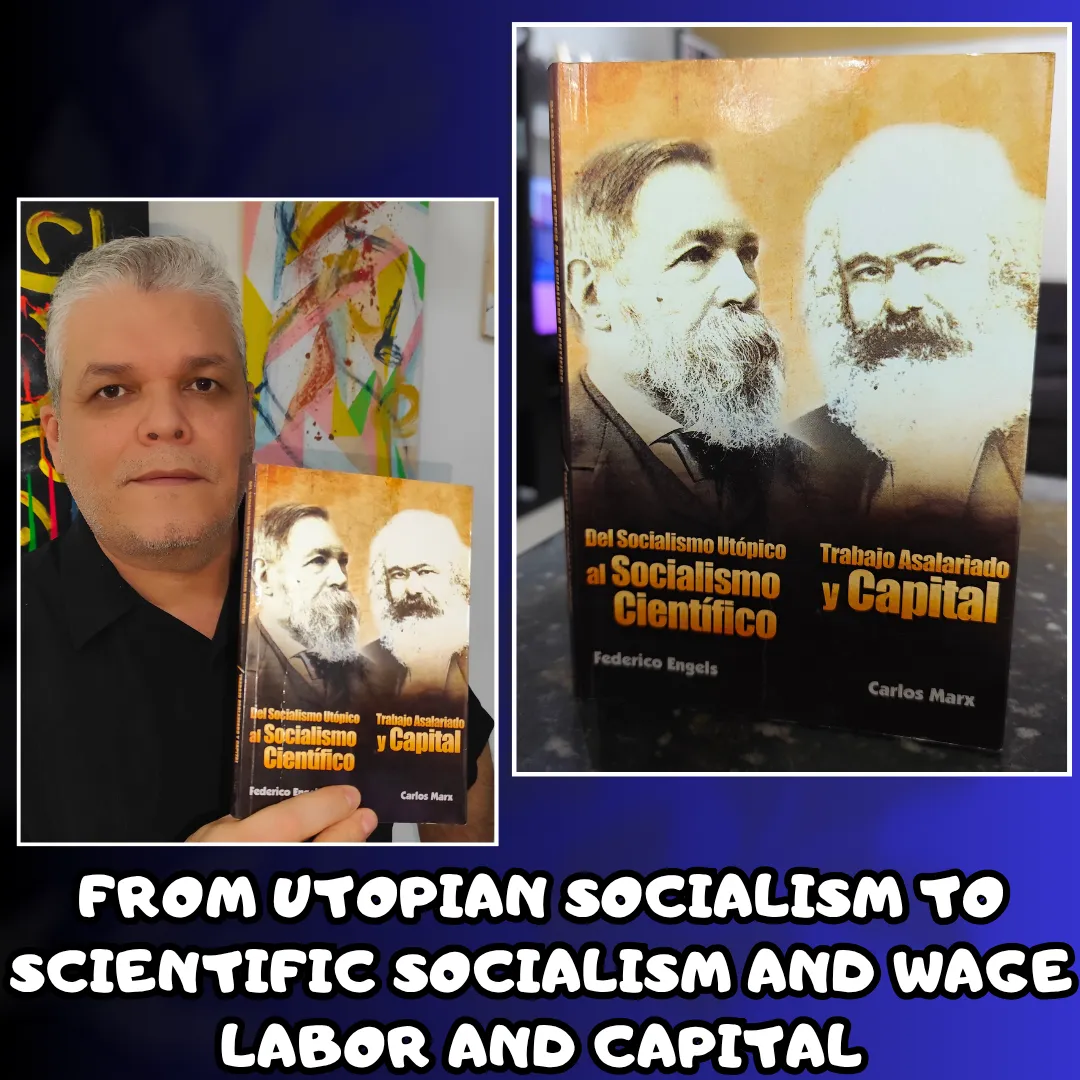 Cover Edited In Canva
Cover Edited In Canva

If we talk about Karl Marx in his work Wage Labor and Capital; here he analyzes in depth how the capitalist exploits the working labor force; in essence, the author expresses with simple examples how the aforementioned occurs. In this case; and this is experienced in the flesh by any worker who fulfills his functions; he performs his activities where daily interactions are evident and anyone can think that it is normal; that is, the worker offers his time, effort and skills to receive a salary; but the question is, does the worker receive a fair salary? Well; it is here where Marx's explanation comes into effect; labor is being exploited and from my point of view, this occurs not only in capitalism; because it can be a disguised socialism; palpable example in our country, currently the minimum wage of a worker is equivalent to $ 1; draw your own conclusions.
In a few words, what Carlos indicates in this book is that the salary received by the worker is not an equitable remuneration for his total work. On the contrary; the capitalist sees that labor force as a product to which he puts his price; that is, the employer is guided by the premises that govern the market to consolidate a single idea; the one that gives him the maximum benefit. To understand a little better what for some may be a tongue twister; this means that the worker fulfills a working day equivalent to his salary; he receives his normal remuneration but continues working in excess, reason for which he does not receive what is fair, which translates into more profits for the capitalist; this is the essence of what Marx denounces in his literary work.

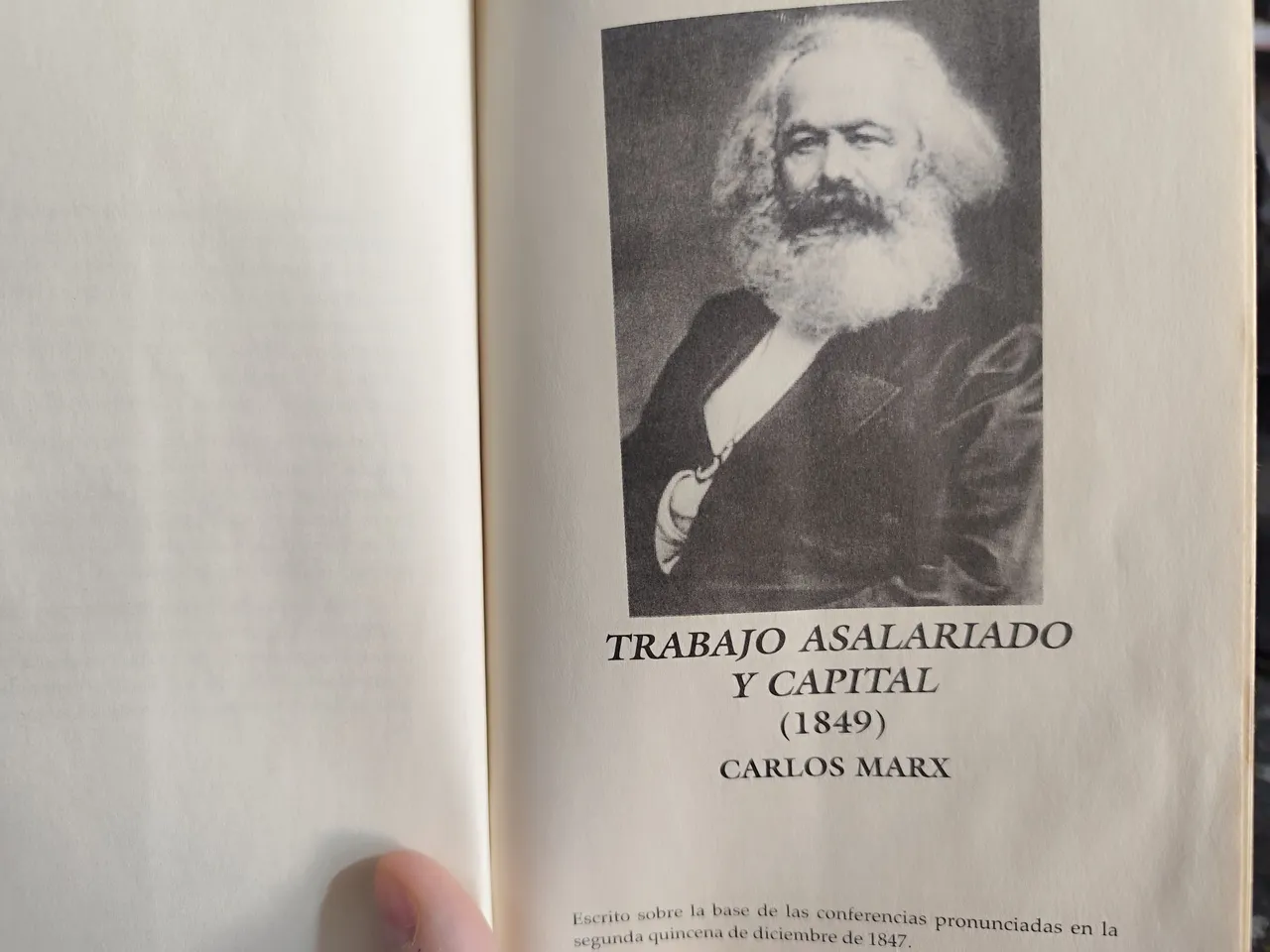
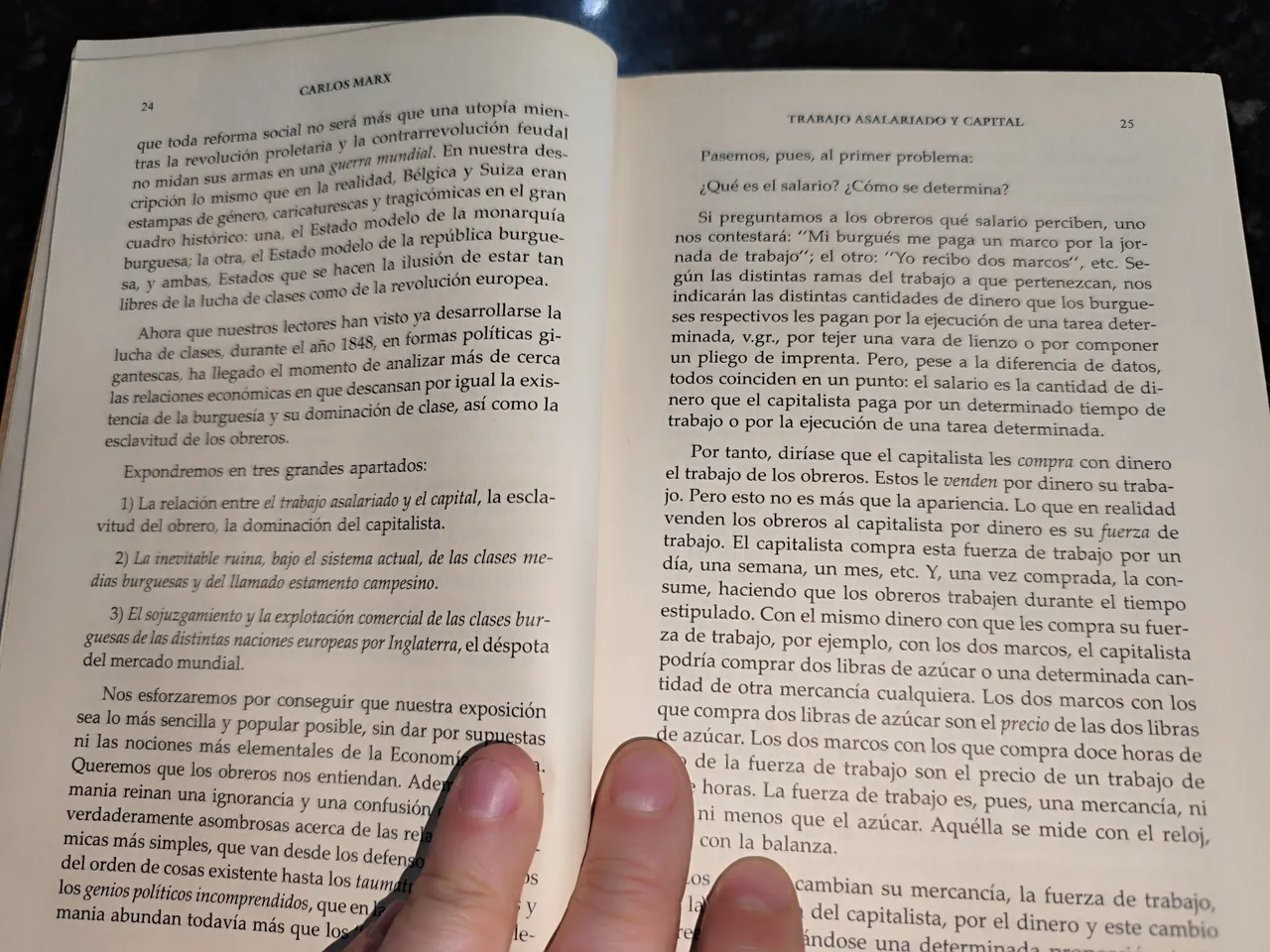

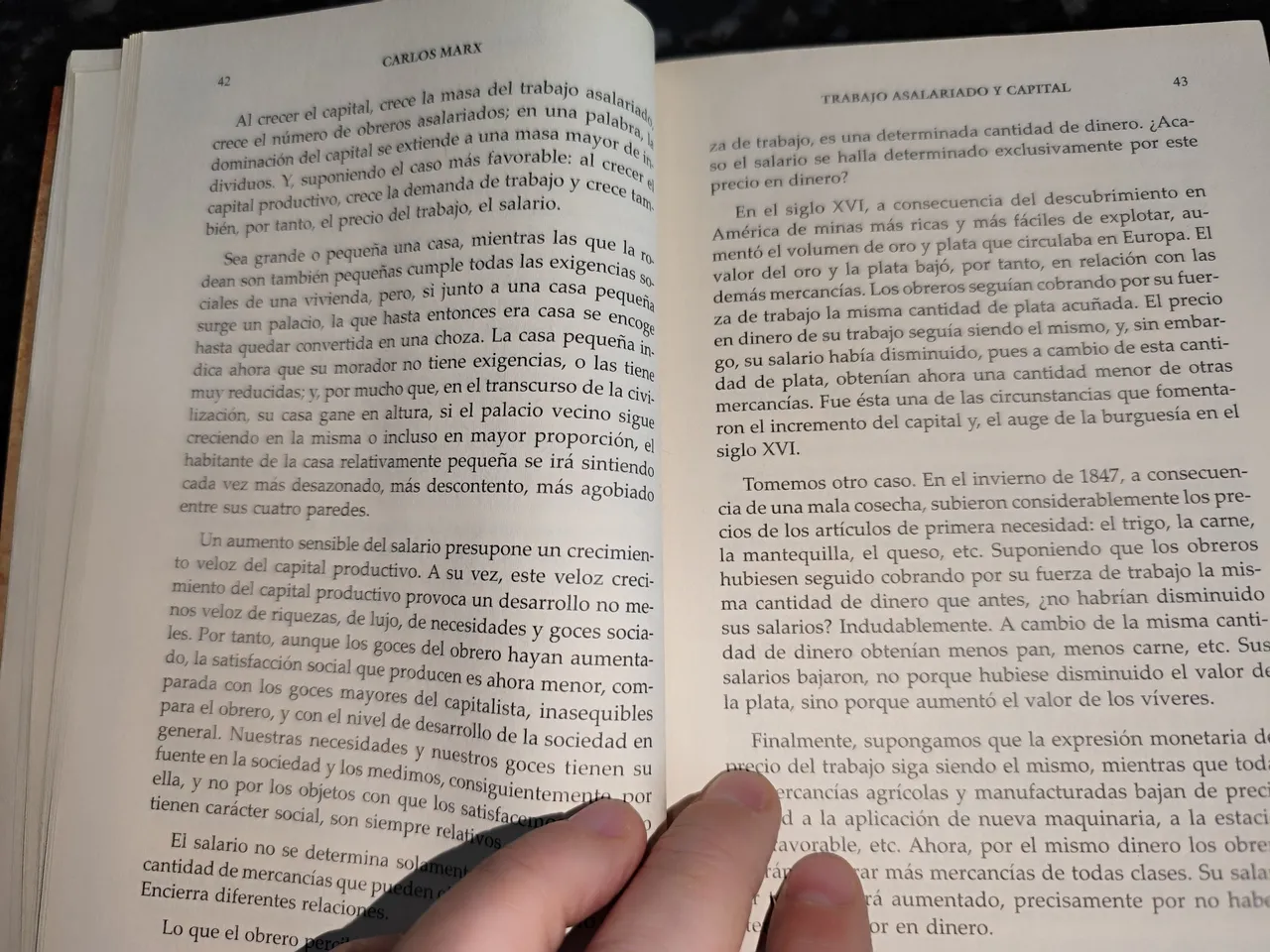
Federico Engels, for example, gives us a vision of those thinkers who see socialism as a magical solution; where there are no injustices, where everyone should be equal and live in fraternity. This would be extremely wonderful; however, the reality is different, because capitalism and industrial society were born, which would represent a society where there would be an abyss between capitalism and the working class. In this sense, the author expresses that this dreamed world lacked real bases and that it depended exclusively on the upper class to bring these magical socialist visions to a successful conclusion. Therefore, analyzing what was internalized during the reading, we realize that the author indicates that society is not the result of something casual, but that it must evolve depending on the development of its means of production. That is to say; it is not a matter of appreciating the form of societies; but of internalizing how they function, what drives their development and the capacity they have to identify their failures. And it is here where Scientific Socialism arises, which affirms what was said before, since it makes us understand that things are not created out of nothing; but are related to the economic aspect of each time.
In general terms; these two thinking figures, together offer us powerful thoughts inherent to society. First, Federico offers us an analysis of history and society, showing its past and its evolution. Secondly; Carlos shows us the real way capitalism works and how it exploits the labor force. In short; these two works are an invitation for the analysis of the past and present world, which leads to investigate the causes and its inner workings, emphasizing the criticism of a system that has allowed an unequal change of societies. Well friends, reading this book really gives us a different vision about the appreciation that one has of societies; how they have evolved and what is still missing for their total development. For those who are interested in this type of reading, I am sure it will be very enriching; greetings to all and see you soon.
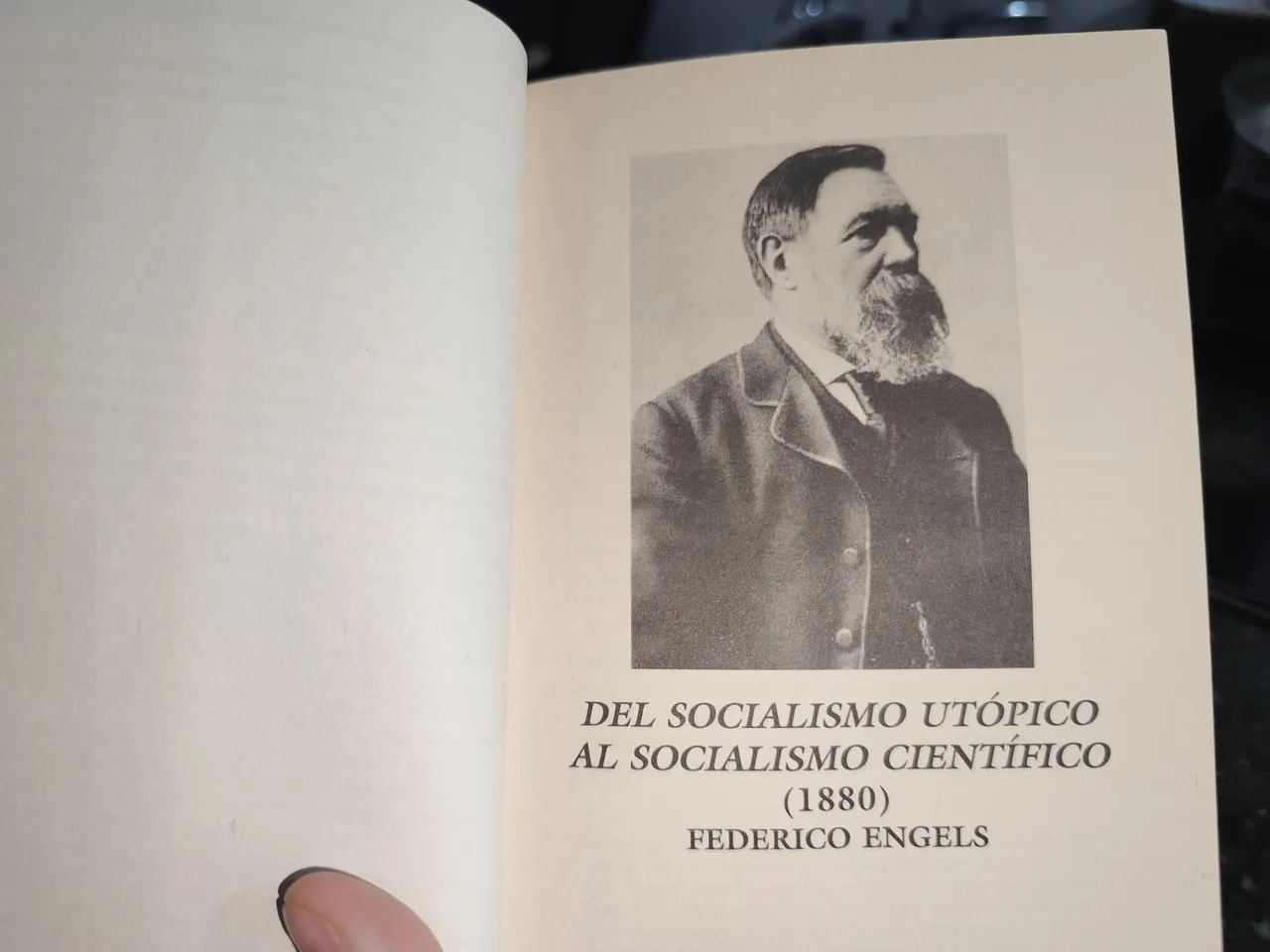
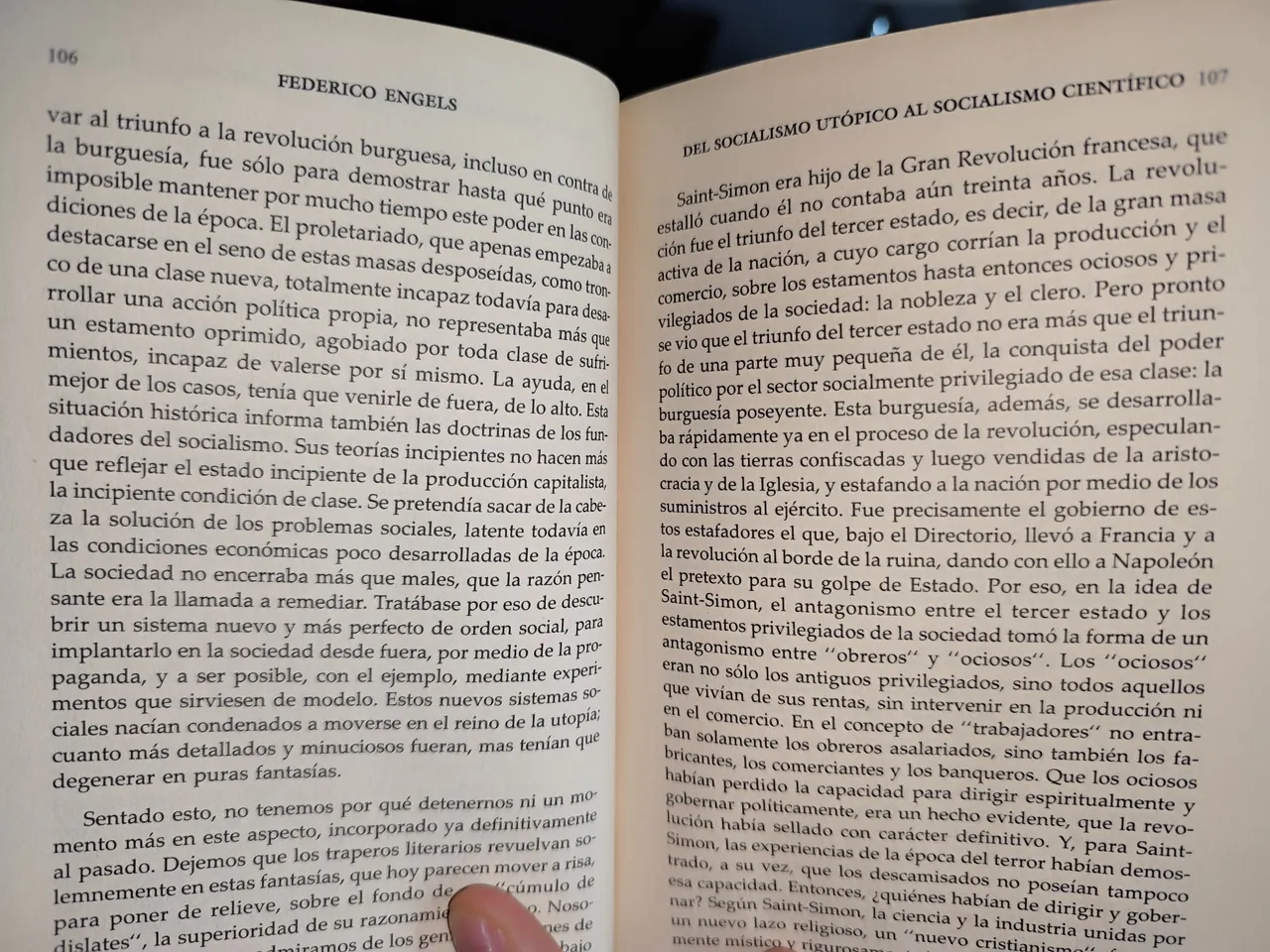





Fotografías tomadas desde mi redmi note 13 pro 5g
Translated and formatted with Hive Translator by @noakmilo
....Versión En Español....
Del Socialismo Utópico al Socialismo Científico y Trabajo Asalariado y Capital. Continuamos en la onda de la economía y las finanzas; pero en esta oportunidad orientadas a la parte social y al capitalismo. En tal sentido; te invito a disfrutar de una de las obras, que en conjunto nos ofrecen Carlos Marx y Federico Engels. Hablar de estos dos personajes, es hablar de dos pensadores que se unieron para construir lo que conocemos como marxismo; teorías que han tenido un impacto profundo en la política, economía, sociología y filosofía a nivel mundial. Estos dos pensadores han creado diversas obras tanto de manera individual, como colectiva; y debo confesar que sus teorías son muy interesantes, lo que me ha impulsado a leer algunas de sus obras; entre ellas, el trabajo colaborativo que hoy es objeto de nuestro analisis.
Ahora; cuando avanzamos en la lectura de este libro, no solo estamos adentrándonos en meras teorías o aspectos económicos y filosóficos; sino que estamos analizando el desarrollo de un pensamiento, que a la postre causaría impacto en el área política, social y económica universal. Sin embargo; desde mi punto de vista, en este libro se plasman dos vertientes que se ponen de acuerdo, para criticar profundamente al capitalismo desde la visión única del marxismo. Por un lado, Engels nos ofrece un camino sobre los pensamientos socialistas del pasado y nos orienta sobre la importancia de avanzar desde lo que se espera, para llegar a un nuevo ideal social. Por otra parte; Marx nos da luces con un análisis metódico sobre el capitalismo; donde indica que el trabajador ofrece su capacidad de trabajo y el capitalista la explota. En fin; dos mundos que se unieron para dar a conocer sus teorías y pensamientos, que hasta la fecha se han hecho sentir en todo el mundo.
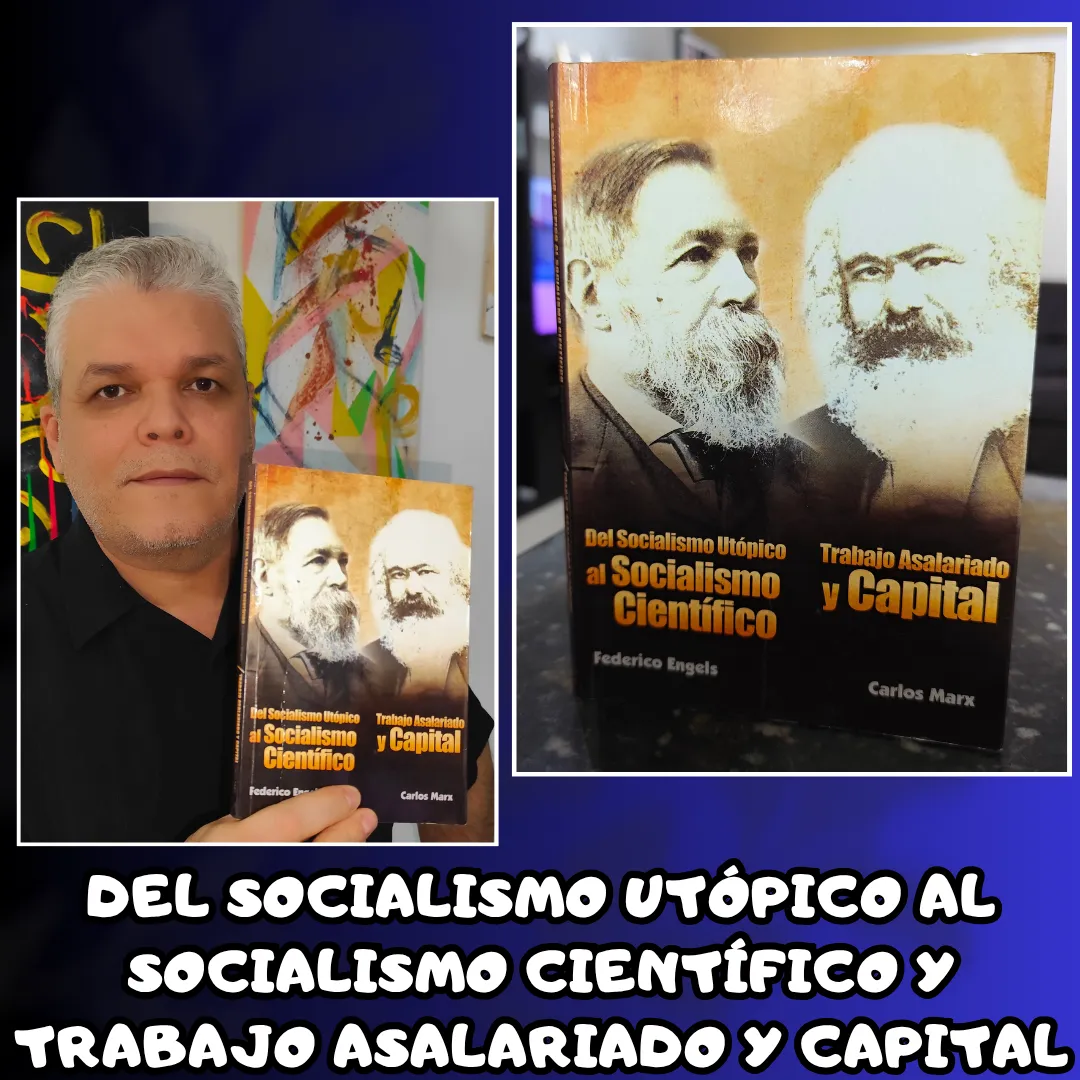 Portada Editada en Canva
Portada Editada en Canva

Si hablamos de Carlos Marx en su obra de Trabajo Asalariado y Capital; aquí se analiza en profundidad la forma como el capitalista explota la mano de obra trabajadora; en esencia, el autor expresa con sencillos ejemplos como ocurre lo antes mencionado. En este caso; y esto lo vive en carne propia cualquier trabajador que cumple sus funciones; éste realiza sus actividades donde se evidencian interacciones diarias y cualquiera puede pensar que es normal; es decir, el trabajador ofrece su tiempo, esfuerzo y habilidades para recibir un salario; pero la pregunta es ¿El trabajador recibe un salario justo?. Bueno; es aquí donde entra en vigencia lo que Marx explica; se está explotando la mano de obra y desde mi punto de vista, esto ocurre no solo en capitalismo; porque puede ser un socialismo disfrazado; ejemplo palpable en nuestro país, actualmente el salario mínimo de un trabajador es equivalente a 1$; saquen ustedes sus propias conclusiones.
En pocas palabras; lo que Carlos indica en este libro, es que el salario que recibe el trabajador no es una remuneración equitativa por su trabajo total. Al contrario; el capitalista ve esa fuerza de trabajo como un producto al cual le pone su precio; es decir, el empleador se guía por las premisas que rigen el mercado para consolidar una sola idea; la que le otorgue el máximo beneficio. Para entender un poco mejor lo que para algunos puede ser un trabalenguas; esto quiere decir, que el trabajador cumple una jornada laboral equivalente a su salario; recibe su remuneración normal pero continúa trabajando en exceso, razón por la cual no recibe lo justo, lo que se traduce en más ganancias para el capitalista; esta es la esencia de lo que denuncia Marx en su obra literaria.





Federico Engels por ejemplo, nos da una visión de aquellos pensadores que ven el socialismo como una solución mágica; donde no existen injusticias, donde todos deben ser iguales y vivir en fraternidad. Esto sería sumamente maravilloso; sin embargo la realidad es otra, porque nacía el capitalismo y la sociedad industrial, lo que representaria una sociedad donde habría un abismo entre capitalismo y la clase trabajadora. En tal sentido; el autor expresa que ese mundo soñado estaba falto de bases reales y que dependían exclusivamente de la clase alta, para llevar a feliz término esas visiones socialistas mágicas. Por ello; analizando lo internalizado durante la lectura, nos damos cuenta que el autor indica, que la sociedad no es el resultado de algo casual; sino que debe evolucionar dependiendo del desarrollo de sus medios de producción. Es decir; no se trata de apreciar la forma de las sociedades; sino de internalizar como funcionan, que impulsa su desarrollo y la capacidad que tienen de identificar sus fallas. Y es aquí donde se plantea el Socialismo Cientifico que afirma lo antes dicho, ya que nos hace entender que las cosas no se crean de la nada; sino que están relacionadas con el aspecto económico de cada tiempo.
En términos generales; estas dos figuras pensantes, nos ofrecen en conjunto pensamientos poderosos inherentes a la sociedad. En primer lugar; Federico nos ofrece un análisis sobre la historia y la sociedad, mostrando su pasado y su evolución. En segundo lugar; Carlos nos demuestra la forma real sobre el funcionamiento del capitalismo y como este explota la mano de obra trabajadora. En fin; estas dos obras son una invitación para el analisis del mundo pasado y actual, lo que conlleva a investigar sobre las causas y su funcionamiento interno, haciendo énfasis en la crítica hacia un sistema que ha permitido un cambio desigual de las sociedades. Bueno amigos; de verdad que leer este libro, nos da una visión diferente sobre la apreciación que uno tiene de las sociedades; como han evolucionado y lo que aún falta para su desarrollo total. Para quienes están interesados en este tipo de lectura, estoy seguro que será muy enriquecedora; saludos a todos y nos vemos pronto.







Fotografías tomadas desde mi redmi note 13 pro 5g
Translated and formatted with Hive Translator by @noakmilo